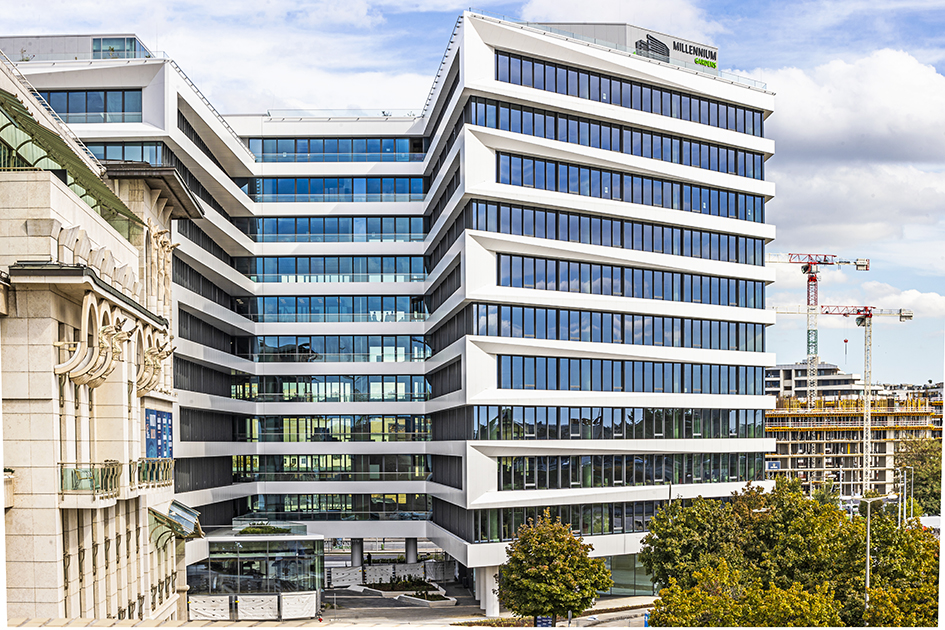Real Estate Market Actors Look to Upturn for 2024

Academia is a Well pre-certified renovation project by ConvergenCE and Europa Property.
It remains an open question when investment activity in Hungary and the CEE region will pick up after a subdued period due to concerns over the cost of finance, and the uncertain economic and geo-political environment, says real estate editor Gary J. Morrell. Another worry is how long yield corrections will continue.
Despite concerns over the cost of construction and debt finance and also around demand, healthy pipelines remain in the industrial, hotel and office sectors. All projects must be of a standard to meet changing tenant, customer, staff and guest expectations regarding the quality and design of space and increasingly strict and all-embracing sustainability requirements.
“I don’t expect much noise on the investment market in 2024, but we also know that there is money to be spent, so I am certain we will see some interesting deals,” comments Valter Kalaus, managing principal at Newmark VLK Hungary.
“I expect 2024 to be a difficult but interesting year. I don’t anticipate many new projects, but I do expect some interesting resurrections of old ones and re-births of some forgotten ones. Both the office and industrial segments might show good signs so that we might see some noteworthy transactions. Tenants who are in the position to make a move can most certainly get some outstanding deals,” Kalaus adds.
Yields have softened in every asset class. Further softening is subject to market sentiment, according to iQ Partners Hungary. As of Q3 of 2023, yields for Hungary were put at 6.5% for office, 6.75% for industrial and 7% for shopping centers. Budapest office yields had shifted by 75-100 basis points, a common trend across the Central European capitals.
Rita Tuza, director of capital markets at iQ Partners Hungary, sees an upturn in the Hungarian investment market in the second half of the year with less strict financial conditions from lenders, more certainty regarding pricing and yields, and buyers not waiting for further yield compression. In general, around 70% of transactions are being undertaken by Hungarian investors.
Office Pipeline
IQ Partners have traced a 287,000 sqm pipeline of office space for 2023-2026. Of this, 96,000 sqm has already been completed and occupied, and 192,000 sqm is available. Planned developments with a minimum of 24 months of construction time stand at 562,000 sqm. Concerning tenant expectations, the hybrid model has become a permanent element of the future of work. The consultancy expects a 14-15% vacancy rate by 2025.
“With regard to [the] office [sector], according to our expectations, demand for prime locations and modern, green, energy-efficient, and ESG-compliant office buildings will remain stable, leading to higher vacancy rates in older spaces,” Colliers says.
“Additionally, there is a greater emphasis on employee needs in today’s business environment, prompting more companies to choose central, easily accessible locations with a wider range of services, rather than the outskirts or suburban areas,” the agency comments.
“Overall, the office market will continue to be tenant-driven in 2024, with flexibility in contracts remaining of fundamental importance. We do not anticipate a significant turnaround in vacancy rates, particularly in lower-grade properties and locations outside the central submarkets,” Colliers adds.
The cost-to-value ratio of available tourist and hospitality services in Hungary is exceptionally competitive compared to other popular destinations around Europe, according to Wing, currently a prolific hotel developer. By 2024, passenger traffic at Budapest Ferenc Liszt International Airport is foreseen to reach the 16.5 million record set in 2019.

Liberty, a hotel and office project developed by Wing.
Diversification Strategy
“We have launched several new hotel projects and continued to implement ongoing ones. Diversifying our accommodation projects is also an integral part of our strategy in terms of location and brands,” says Ernő Takács, deputy CEO for hotels and retail at Wing.
“We started hotel construction projects on airport property, with the new Ibis Styles Budapest Airport Hotel, which opened in 2018. This will be joined [alongside] by a four-star Tribe hotel, which is also a Wing development,”
He argues that building with environmentally conscious and sustainable perspectives in mind makes for more accessible project financing, and as in the office sector, this could play a part in the decisions that hotel investors make.
“What’s more, modern hotels built and operated in this way are an increasingly important factor for hotel visitors. This gives a competitive advantage to developers making these hotels over other buildings that are considered obsolete in this regard,” Takács says.
Benjamin Perez Ellischewitz, principal at Avison Young Hungary, believes renovations of older buildings will play a vital role in how the market develops in 2024 and beyond.
“A significant amount of work will come in the coming years to upgrade the existing stock of assets in line with new standards and reduce the carbon footprint of the real estate activity. The future will be more and more about brownfield development and repurposing existing structures,” he comments.
Increasing Resiliency
In 2024, businesses will be looking for solutions that make the company and their communities more resilient so that no matter what challenges are faced, society is better prepared and can bounce back faster. Leading brands increasingly use Well to drive ESG performance and reporting.
For example, pharmaceutical company MSD (Merck in the United States and Canada) has 44 offices enrolled in the scheme worldwide, with six already Well Certified. The MSD Budapest office (in the Millennium Gardens building at Lechner Ödön Fasor 10/b in District IX) is Well pre-certified and expected to become a fully certified space in 2024, according to Regina Kurucz, architect and Well assessor.
“I also expect the rise of inclusive spaces in 2024 in Budapest. There is much interest in certified programs like Access4you and the Well Equity Rating. Inclusive spaces are a better environment for all, for example, people with strollers, people with reduced mobility, the elderly or people with neuron diversity. So inclusive spaces provide a competitive advantage,” she adds.
Zsombor Barta, an ambassador for and former president of the Hungarian Green Business Council, agrees with Perez Ellischewitz that the renewal of existing assets and portfolios will become the new and leading issue, as ESG and EU Taxonomy requirements are pushing these stakeholders into energy efficiency investments and retrofits.
“I think we have to add to our sustainability certification vocabulary one or two more certifications or verifications; the EU Taxonomy verification is something more and more requested by financial institutions or investors, as this is about sustainable business activities and this is needed if beneficial financial or investment conditions are applied to a project or portfolio,” Barta explains.
Gaining Significance
Given that ESG is a hot topic, certifications that support the “S” (social) element of ESG screening and data provision, such as Access4You, a system that certifies the overall accessibility of the built environment, will also gain significance.
“In the end, we need more [third-party] verified data for ESG or other sustainability reports because credibility and transparency are an extremely important part of these new reporting schemes or investment requirements,” Barta believes.
According to CBRE figures, 81% of surveyed investors will adopt ESG criteria in all investment decisions despite macroeconomic headwinds and a challenging geo-political landscape.
Hubert Abt, CEO of New Work Offices and Workcloud24, argues that ESG compliance will become the buzzword of 2024.
“With more education and pressure from banks, tenants and investors, landlords will realize the need to comply with the EU Taxonomy, and that spending on ESG compliance is [….] a highly profitable investment,” Abt says.
Industrial Growth
Demand for industrial and logistics properties is expected to remain more robust than for other types of real estate, but increasing vacancy is anticipated due to expected significant new deliveries.
“There is a growing focus on green warehouses, driven by increasing investor and tenant demand for long-term sustainable operations and energy-efficient functions. Developments are supported by the expected strengthening of the EUR/HUF exchange rate and a slow in the growth rate of construction costs that was prevalent in previous years,” comments Colliers.
“The most sought-after asset classes are expected to include industrial and logistics properties, certain smaller retail assets, strip malls, as well as core office spaces. In the retail sector, investors are likely to focus on strip malls and high street assets with long-term agreements,” the consultancy says.
“The increasing importance of fulfilling ESG criteria is evident, even for investors who may not have prioritized this aspect previously, and this will likely be reflected in pricing. In the CEE region, unconventional sectors such as healthcare and data centers are gaining popularity. In Hungary, there is also an expectation that alternative investments will receive more attention in the upcoming period,” Colliers adds.
Noah Steinberg, chairman and CEO of Wing, sees much room for e-commerce to develop in Hungary but also for logistics providers to cover neighboring countries from Hungarian locations. The strong growth in manufacturing also supports the warehouse market as suppliers to these plants also need property to operate in.
“We are not out of the woods yet. While we have now reached the end of the interest rate increase at the ECB level, major economies in Europe are by now in recession. Bottlenecks remain the lack of debt and the difficulty to price the risk in this period of uncertainty and deteriorating fundamentals. I expect a relatively quiet first semester of 2024 with activity picking up towards the end of [the year],” concludes Perez Ellischewitz of Avison Young Hungary.
The Hungarian property scene has welcomed a new development company established by three experienced real estate market players at the end of 2023. Realis Development is part of Realis Group, a holding company that has been active since 2013.
The development company was established to create premium quality property products in Hungary and CEE that generate financial value but also contribute to the aesthetic, technical and sustainability standards of the built environment, according to the company.
Realis Development’s portfolio has a line-up of modern and heritage projects in the hotel and residential segments, with longer-term plans including office developments.
“Together with my business partners Tamás Ádány, CFO, and Zsolt Gyöngyösi, development director, we have built an expert team equipped with all-around real estate competencies,” commented the founding partner and CEO Mihály Schrancz, who for many years headed up the multi-functional BudaPart neighborhood development in Újbuda, adjacent to the Danube and across the Lágymányosi Bay from the popular rest, recreational, and entertainment hub known as Kopaszi Dam.
This article was first published in the Budapest Business Journal print issue of January 12, 2024.
SUPPORT THE BUDAPEST BUSINESS JOURNAL
Producing journalism that is worthy of the name is a costly business. For 27 years, the publishers, editors and reporters of the Budapest Business Journal have striven to bring you business news that works, information that you can trust, that is factual, accurate and presented without fear or favor.
Newspaper organizations across the globe have struggled to find a business model that allows them to continue to excel, without compromising their ability to perform. Most recently, some have experimented with the idea of involving their most important stakeholders, their readers.
We would like to offer that same opportunity to our readers. We would like to invite you to help us deliver the quality business journalism you require. Hit our Support the BBJ button and you can choose the how much and how often you send us your contributions.











